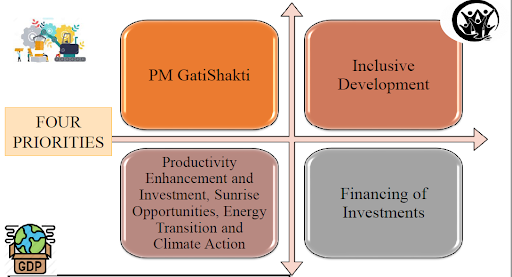Just like last year, this time too, there are not any negative surprises in Budget 2022. When there is development and growth in mind, spending and investment require money. But when the government does not ask more of this from you by increasing the taxes, then this is a good budget..right?
This year too, Madam Finance Minister focused on increasing the public spending on infrastructure development by specifically saying that Public investment is required to encourage private investment.
Union Budget 2022 was wrapped up into 4 priorities- PM Gatishakti Masterplan, Planned Infrastructure Development and Financing, Inclusive Development, and Climate Action.

A 34 percent increase in Capital Expenditure amounting to Rs. 7.50 Lakh crores shows how serious the government is to revive demand, create jobs and boost up the growth in the economy. 65% of the defense budget for domestic companies is another step towards Atamnirbar Bharat.
Although to provide thrust to the economic growth, the fiscal deficit remains at 6.9% of the GDP, and for next year it is projected to be 6.4%, which was not liked by the bond market.
But when the target is growth with sustainable development, some things surely get compromised, and when the results come as expected then the imbalance that earlier actions had created, automatically settles down. This is what the government feels so they never shy away from spending just to keep the fiscal deficit in check.
As far as personal finance is concerned, there are very few changes announced. All the tax slabs, deductions are kept unchanged. Any additional tax or cess was also not introduced.
Important Personal Finance Announcements in Budget 2022:
1. Tax on Gains of Virtual Digital Assets (VDA):
This announcement perhaps has caught the most eyeballs. The gains on Virtual Digital Assets like- Cryptocurrencies, NFTs, etc. would be taxed at the maximum income tax rate of 30%. Also, no deduction for any expenses would be provided except the Cost of Acquisition. Set-off or carry forward of losses would also not be allowed.
In addition, gifts of Virtual Digital Assets exceeding Rs. 50,000 would also be taxable in the hands of the recipient. All rules for the taxation of gifts would be applicable to this as well.
This would come into effect from 1st April 2023.
2. TDS on VDA transactions:
With effect from 1st July 2022, TDS @1% would be applicable on all the transactions involving Virtual Digital Assets like- Cryptocurrencies, exceeding Rs.10,000 in the case of individuals/HUFs not requiring tax audit. If the Individual/HUF is subject to a tax audit, the value exceeds Rs. 50,000. The liability to deduct the TDS rests in the hands of the buyers of such assets.
This would help the Government to keep track of the transactions happening in this space and make sure that taxes are paid on the same.
(Also Read: Is it worth riding the Cryptocurrency wave?)
3. RBI would issue Digital Currency:
The Government would be coming up with its own Digital Currency. It was proposed in the Budget that the RBI would issue Digital Rupee using Blockchain technology.
This would not only be a big step towards the cashless economy but also reduce the government expenditure on printing and circulation of physical currency notes. In addition, there would be no question of counterfeiting.
4. Updated Return:
If any assessee has missed out to declare any income in his/her Income Tax Return, he/she can file an updated return within 2 years from the end of the particular assessment year. Also, the payment of additional tax equal to 25 percent on the unpaid tax, if the updated return is filed within 1 year or 50 percent if filed after 1 year on the undisclosed income along with the applicable interest.
This would improve tax compliance by citizens and reduce litigation.
5. Increased NPS Deduction for state government employees:
For Central Government employees, the maximum deduction with respect to NPS is 14% of salary on the employers’ contribution. For all others, including the state government employees, the deduction is 10% of the salary, even if the contribution is of a higher amount.
To bring the state government employees at par with the central government employees, this limit has been increased from 10% to 14%, w.e.f. 1st April 2020.
(Also Read: New NPS withdrawal rules for Government employees & Citizens)
6. Annuity/Lump-sum Payment to a person with disability:
Presently, under Section 80DD of the income tax act, a deduction is allowed to a resident individual being the parent/guardian of a disabled dependent, with respect to the lump sum or annuity received from an insurance policy taken for the benefit of the dependent, in the event of the death of the subscriber, i.e., the parent/guardian.
In Budget 2022, it was proposed that the aforesaid deduction would also be available on the lump sum/ annuity received during the lifetime of the guardian when he/she attains 60 years of age.
(Also Check: Income Tax Deductions List)
7. Exemptions for money received for treatment of/ Death due to COVID:
Any sum of money received by any individual from his employer or any other person or persons with respect to the treatment of Covid for self or family members would not attract any taxation.
Also, if the family member of a deceased person receives any amount up to Rs.10 lakhs from his/her employer or any other person or persons in the event of death due to Covid would also remain tax-free, if the amount is received within 12 months from the death of the individual.
8. Cap on Surcharge:
Surcharge on Long term Capital Gains on the transfer of any capital asset would be capped at 15%, which may be as high as 37% in some specific cases. (Also Read: Capital Gains tax rules you may not be aware of)
9. TDS on sale of Property:
This is basically a clarification of an Income Tax Provision. If the sale consideration or the stamp duty value of the property (excluding agricultural land) exceeds Rs. 50 Lakhs, a TDS @1% needs to be deducted by the buyer of the property.
Previously, there was confusion about whether to deduct TDS if either the stamp duty or sale consideration is less than 50 Lakhs, which is now clarified.
(Also Read: How to save capital gains tax on Property?)
Some other Key Announcements in Budget 2022:
- All the post offices would enable net banking, mobile banking, ATMs and online transfer of funds between post office accounts and bank accounts. It would help senior citizens and farmers, enabling financial inclusion.
- Issuance of Sovereign Green Bonds to promote Green Infrastructure. Proceeds of these bonds would be deployed in the public sector projects that help in reducing carbon footprint. This is a common practice seen in some of the Western Countries.
- Rollout of the issuance of chip-based e-passports & 5G services.
Conclusion:
Like Every year, this time also I would say that the Union Budget comes and goes, what matters is how the budgets are going to impact your life. No announcements can do that. Only actions can.
The government will take care of the country and you have to take care of yourself and your family. Find out the areas that need your attention, where do you want to reach, and feel that reaching there will bring wellness in your life. And make a plan, a budget to reach there.
But do keep in mind that unlike the government you cannot afford a deficit, so manage the cash flow accordingly ;).







 Manikaran Singal is the founder and Chief financial planner at Good Moneying Financial Solutions. He is a CERTIFIED FINANCIAL PLANNER CM and SEBI registered Investment adviser (Regd no. INA 100001620). He’s having 20+ years of experience in financial services space.
Manikaran Singal is the founder and Chief financial planner at Good Moneying Financial Solutions. He is a CERTIFIED FINANCIAL PLANNER CM and SEBI registered Investment adviser (Regd no. INA 100001620). He’s having 20+ years of experience in financial services space.

